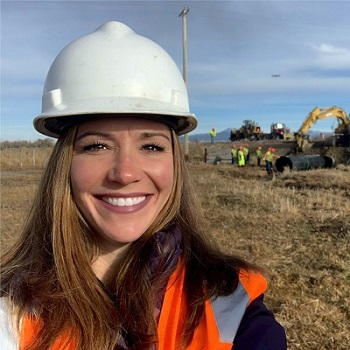To keep a finger on the pulse of what is going on in construction, I’ve been reaching out to various industry leaders to discuss construction-related topics that Construction Citizen’s readers may find of interest. Throughout these conversations, I’ve learned a lot, gained new perspectives, and have been constantly inspired by these leaders’ success stories, passion, and character.
A common thread in several of my recent conversations has been the vast career opportunities available to men and women in the construction industry and how these options are often overlooked because people haven’t been made aware of them or have been dissuaded from pursuing them. As a result, many construction companies are hurting from a lack of workforce.
 During my conversation with Cassie Clancy, CEO of Pipe Reline Solutions and Reline LIVE & Reline Unknown Podcast Host, she discussed the need for more communication and education surrounding career paths out of high school that can be pursued without a four-year degree, such as the skilled trades and vocational-technical careers.
During my conversation with Cassie Clancy, CEO of Pipe Reline Solutions and Reline LIVE & Reline Unknown Podcast Host, she discussed the need for more communication and education surrounding career paths out of high school that can be pursued without a four-year degree, such as the skilled trades and vocational-technical careers.
“I think there are a lot of great organizations that are really promoting construction. I am involved in the National Association of Women in Construction, and we heavily promote scholarships for young women who want to get into engineering, into any field in construction.
And what's sad is that this year, we (NAWIC Boise Chapter) put out our scholarship and we didn't have any applicants.
So, I think a lot of it is, as women and as an industry - educate. I don't know if it's the stigma of ‘construction is a grunt work and men's industry.’ It's not.”
Cassie continued, speaking about the huge variety of specialized positions in construction, how pay in her field has drastically increased throughout the years, and how an exploration of interests and an inside look at various careers should be encouraged.
“I think everyone, doesn't matter who you are, should spend a day on a construction site and just see what it's like. Just like you should in any field. You should go spend a day with an engineer, you should go spend a day with a veterinarian. You should spend a day in every different career so you can really see what a day looks like in that field, so you can see if that's something you're interested in.”
 I spoke with Leslie Gower, CEO of AGC of East Tennessee, who is helping to address the skilled trades workforce shortage in the region through a Construction Career Center vocational school that will be opening this October. In addition to the career center, they are putting a marketing piece into play to highlight the trades and available opportunities.
I spoke with Leslie Gower, CEO of AGC of East Tennessee, who is helping to address the skilled trades workforce shortage in the region through a Construction Career Center vocational school that will be opening this October. In addition to the career center, they are putting a marketing piece into play to highlight the trades and available opportunities.
“The construction industry in general has done a terrible job of illuminating career pathways for people. The marketing hasn't been there to tell people that these careers are there for you, and in the past thirty years students going through high school were told that you have to get a four-year degree instead of going into the trades and vocational learning.
So, what we are doing in tandem with the school is a marketing component where we will have a website that has a clearinghouse of what the different trades are, how much you can make, what the requirements are to get into the job, and then a job board of available positions in this region.
And there is a perception out there that these are low paying jobs and that's not true at all. I mean it's hard work, but if you’re willing and you have good work ethic, and you’re willing to work hard, you can be pulling in some major coin right now, and you don't need a four-year degree to do that.”
 Kelly Gregory, President and Chief Executive Officer of her 100% woman-owned business, International Women in Construction, LLC, continues to serve as an expert Project Business Professional and advocate for women in project and construction management.
Kelly Gregory, President and Chief Executive Officer of her 100% woman-owned business, International Women in Construction, LLC, continues to serve as an expert Project Business Professional and advocate for women in project and construction management.
Paying it forward, she serves on multiple influential industry boards and committees; for example, Emerging Professionals Chair, South Central Region for the National Association of Women In Construction (NAWIC), and is the Co-Founder and an Executive Board Member of the University of Houston’s Cougars for Women in Construction (CWIC).
Through another lens, Kelly sees a win-win situation in bringing more women into the industry. As a numbers person, she sees a measurable opportunity to help women and the construction industry at the same time.
“When you think of the numbers and you look at the statistics for the women in construction it's 9-10%. That's nationwide and actually the statistics even globally are very similar. So 9-10%.
The other statistic that sticks with me is that from a gender pay gap, in construction it's within 5%. So, a man doing the same role as a woman, vice versa, it's usually only about a 5% inequity if one exists at all. Traditionally, unfortunately in other industries there's a much larger pay gap.
And then here's the other statistic. The amount of construction that is needed and projects globally (but again even bringing it locally), and thinking about, like a pandemic - construction was still essential, the jobs were still there, they didn't miss a beat.
So, you put those three (industry-specific) things together… add that women make up ~50% of the overall workforce and construction has a gap in the number of resources they have versus what they need. It's a tremendous gap.
Their best bet is to have more women in the construction space. They have a whole lot more percentage they can grow and move within construction.”
Kelly went on to talk about mentoring women in the industry and spoke about how cross-functional skill sets, such as those related to information technology, can often transfer to professional roles in the construction industry, such as project management. Kelly also emphasized the variety of positions available, that many are not aware of, that are necessary to make construction happen apart from only “phase four, boots-on-the-ground”, execution.
“Human resources, compliance, audit, business administration, information management – those are all really, highly necessary roles and jobs aside from engineers and tradespeople. And there are just a lot of roles that people are not aware that it takes to make this happen.”
“So, there’s variety, there’s more money, there’s more openings. It’s really a win-win. And if you want to get dirty, you can.”
I appreciate all the industry leaders that have been participating in these discussions. These conversations have broadened my understanding of the construction industry and helped me better understand some of the deep-seated challenges the industry continues to face. As I continue to explore the industry and gather new insights, I hope to pass along what I learn to Construction Citizen readers.


